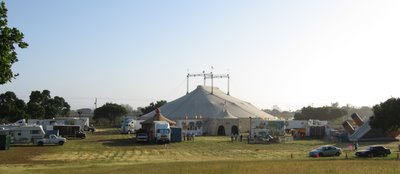
May 28, Novato.
Fuji, who suffered a stroke on Thursday, is still in intensive care in the hospital, but out of critical condition. He'll stay in the hospital at least another week then go into rehabilitation for several weeks more. "He will never be 100%, it is just a matter of time, and effort and seeing what happens," said Jim. But he's lucky in more than one way: he would have died had they failed to transport him right away to the hospital, and he's in one of the best neurological unit around. "And most of the nurses here and doctors have taken their familes to Circus Chimera over the years so they are being especially attentive to Fuji," Jim added.
The circus family is bigger than we think.
"He is sleeping around the clock, and they have to come in every 30 minutes to check his vision, his movement, his motor skills, etc," said Jim, who wants to stay at Fuji's bedside until he's out of the intensive care unit, and is working straight from the hospital room. Most of his work is being done on the computer so this is not an inconvenience, he said, adding, "it is probably a benefit, because it gives me some quiet time to reflect and work without additional pressures."
Fuji will be able to stay in the U.S. thanks to Jim, who is bringing his wife here from Mexico, and is also looking into ways to provide a trailer for them so he can come back and travel with the circus once he's ready and relearn to do the work.
The circus family is bigger than you think.
Fuji, whose real name is Higinio Alvarez Salazar (last one on the right, March 8.) A hard worker, Fuji works in the lights department but was helping out with raising the tent that day.







